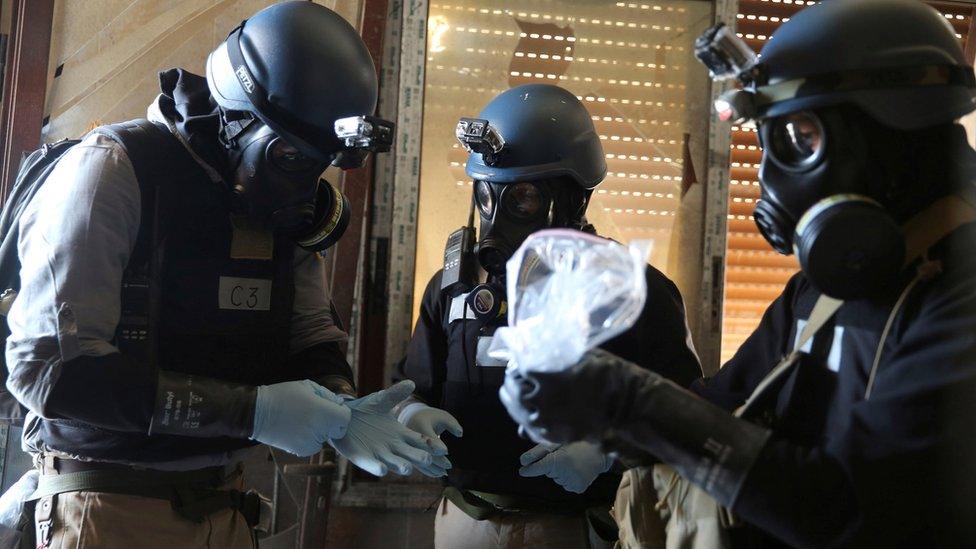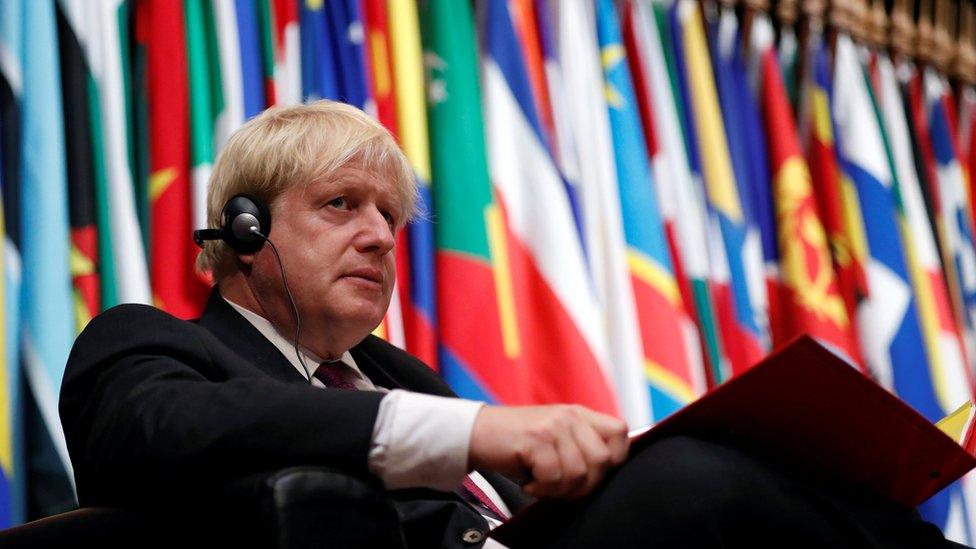Chemical weapons: New watchdog powers an important step
- Published

The findings of inspectors can now include who carried out the attacks
This is an important step forward for arms control.
It strengthens the unravelling consensus against the use of chemical weapons. It marks a victory for the rules-based international order, which itself is under increasing strain given the rise of populists and nationalism in many countries.
But inevitably it will prove to be a new source of tension between Russia and the West.
Until now, chemical weapons inspectors, working under the auspices of the OPCW (the Organisation for the Prohibition of Chemical Weapons) were in a curious position.
They could send teams to an alleged chemical weapons attack. They could take samples and draw their conclusions. They could determine whether indeed a chemical weapons incident had occurred.
But whatever evidence they turned up, they could not point the finger at a particular country or non-state actor as the perpetrator.
That was, of course, nonsense.
It was like having a detective investigate a killing, only to conclude that yes indeed, murder most foul has been committed, but then being unable to identify the likely culprit.
One way of getting around this was the so-called Joint Investigative Mechanism - a concerted effort by the OPCW and the UN to investigate some of the alleged chemical attacks in Syria.
In difficult conditions this did indeed investigate alleged chemical attacks in Syria and found sufficient evidence to determine that the Syrian Arab Armed Forces (President Bashar al-Assad's troops) were responsible for three chemical weapons attacks in 2014 and 2015, and that the Syrian regime was responsible for the Sarin nerve agent attack in April 2017 in Khan Shaykhun.
The identification of the Syrian authorities and their armed forces as responsible for these attacks was too much for Moscow, which has never accepted the culpability of its Syrian ally. It effectively pulled the plug on the joint mechanism last year.
Many Western governments were already coming to the view that some kind of serious effort was needed to revise the way the OPCW worked.
Naming the authors of chemical attacks was seen as a vital step - not just in terms of international justice, but also to reinforce the ban on the manufacture, stockpiling and use of chemical weapons, which seemed to be slowly unravelling.
The use of a nerve agent in the attempted murder of a former Russian intelligence officer and his daughter in the English city of Salisbury earlier this year added further ammunition to those who believed that much more needed to be done to reinforce the chemical weapons ban. Britain, backed by several other Western governments, tabled a draft proposal for the OPCW to significantly strengthen its role.

Britain's proposed text cleared the hurdles with votes to spare
With its explicit mention of the Syrian attacks and a reference to the episode in Salisbury (which the British government insists involved a type of nerve agent developed in Russia), this draft text was never going to get Moscow's backing. A rival Russian text was tabled but then withdrawn - perhaps when it became clear to its backers that they would not garner sufficient votes to derail the British proposal.
Today's decision specifically refers to Syria - the conflict in which chemical weapons have been used most frequently in recent years. British officials believe that the OPCW's director general now has the authority to conduct more effective investigations in that country. The agreed text also raises the possibility that the OPCW might be able to attribute blame for other attacks on which it has not yet reported.
This raises the intriguing possibility that the OPCW's pending report on the alleged use of sarin in the Syrian town of Douma might also include some attribution of responsibility - should the use of chemical weapons indeed be proven.
OPCW member states will meet again in November to discuss giving the organisation powers to "name and shame" chemical weapons users elsewhere.
This decision is inevitably going to exacerbate friction between Russia and the West.
Moscow, Tehran and Damascus all opposed the draft text. Russia was not a fan of the OPCW's investigations prior to this vote and it will be even less so afterwards.
One Russian minister is warning that "a lot of the countries that voted against the measure are starting to think about how the organisation will exist and function in the future". That sends a worrying signal, since the universality of any arms control regime is essential to its success.
British Foreign Secretary Boris Johnson, speaking ahead of the OPCW vote, summed up the views of many of the advocates of the changes, insisting that the world had a responsibility to future generations.
"What would it say about us," he asked, "if we allowed the emergence of a new taboo, a taboo not on using chemical weapons but on identifying those responsible. None of us wants our children to grow up in a world were the use of chemical weapons becomes normalised."
Attributing responsibility for chemical attacks of course is one thing. What you then do about it is quite another.
Will attribution lead to more punitive air strikes like those carried out by the US and its allies against the Syrian regime?
And if so, will these types of attacks be sufficient to deter future chemical use?
So far, that has not been the case.